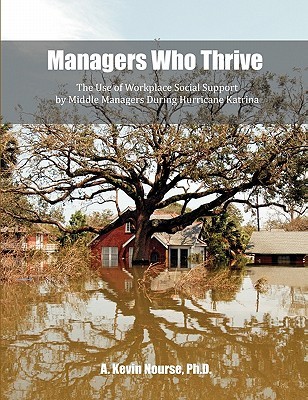
- We will send in 10–14 business days.
- Author: Kevin A Nourse
- Publisher: Dissertation.Com
- Year: 2011
- Pages: 272
- ISBN-10: 1599423839
- ISBN-13: 9781599423838
- Format: 18.9 x 24.6 x 1.5 cm, minkšti viršeliai
- Language: English
- SAVE -10% with code: EXTRA
Reviews
Description
This qualitative study explores how middle managers who thrived during Hurricane Katrina used their workplace social support systems. An emphasis was placed on identifying the sources and types of support received before, during, and after the Katrina crisis. Significant challenges exist today for organizations on the basis of societal, political, environmental, and technological trends. Among those trends are predictions of greater numbers and intensities of weather-related crises triggered in part by global weather pattern shifts and global warming. These challenges create a compelling need for leaders to effectively plan for and manage crises to assure organizational survival. Middle managers, in particular, play a critical role in terms of planning for and recovering organizational functioning after a crisis. Yet relatively little is known about how they subjectively experience adversity and receive social support in the workplace. This study draws upon three bodies of literature including thriving, social support and crisis management. The participants in this study were 14 middle managers employed by organizations in the greater New Orleans area impacted in 2005 by Hurricane Katrina. Industries represented include health care, higher education, seaports, and defense contracting. Participants were nominated by a senior leader in their organization based on criteria for thriving. Data were collected through semi-structured interviews about participants' experiences before, during and after the Katrina crisis and the types of social support they received from each of five workplace sources. After identifying two core experiences for each participant, the data were coded and analyzed to determine the workplace sources and type of received social support. Sixteen themes were identified that explained how participants received support from leaders, peers, subordinates, other internal as well as external supports. Four support patterns were identified based on the most important source of support for the participants. These support source patterns included a peer-focused, leader-focused, subordinate-focused and leader-external focused. Role modeling was identified as a source of received support for some participants as well as the role of work teams in providing social network support. Practical implications of the study findings were identified along with suggestions for future research.
EXTRA 10 % discount with code: EXTRA
The promotion ends in 22d.21:17:03
The discount code is valid when purchasing from 10 €. Discounts do not stack.
- Author: Kevin A Nourse
- Publisher: Dissertation.Com
- Year: 2011
- Pages: 272
- ISBN-10: 1599423839
- ISBN-13: 9781599423838
- Format: 18.9 x 24.6 x 1.5 cm, minkšti viršeliai
- Language: English English
This qualitative study explores how middle managers who thrived during Hurricane Katrina used their workplace social support systems. An emphasis was placed on identifying the sources and types of support received before, during, and after the Katrina crisis. Significant challenges exist today for organizations on the basis of societal, political, environmental, and technological trends. Among those trends are predictions of greater numbers and intensities of weather-related crises triggered in part by global weather pattern shifts and global warming. These challenges create a compelling need for leaders to effectively plan for and manage crises to assure organizational survival. Middle managers, in particular, play a critical role in terms of planning for and recovering organizational functioning after a crisis. Yet relatively little is known about how they subjectively experience adversity and receive social support in the workplace. This study draws upon three bodies of literature including thriving, social support and crisis management. The participants in this study were 14 middle managers employed by organizations in the greater New Orleans area impacted in 2005 by Hurricane Katrina. Industries represented include health care, higher education, seaports, and defense contracting. Participants were nominated by a senior leader in their organization based on criteria for thriving. Data were collected through semi-structured interviews about participants' experiences before, during and after the Katrina crisis and the types of social support they received from each of five workplace sources. After identifying two core experiences for each participant, the data were coded and analyzed to determine the workplace sources and type of received social support. Sixteen themes were identified that explained how participants received support from leaders, peers, subordinates, other internal as well as external supports. Four support patterns were identified based on the most important source of support for the participants. These support source patterns included a peer-focused, leader-focused, subordinate-focused and leader-external focused. Role modeling was identified as a source of received support for some participants as well as the role of work teams in providing social network support. Practical implications of the study findings were identified along with suggestions for future research.


Reviews